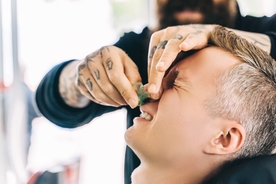A gynecologist has spoken out about urging women not to remove their pubic hair.
Speaking to the BBC, Dr Jen Gunter author of The Vagina Bible, revealed that waxing or shaving 'downstairs' can cause genital depilation. Gunter said: "When you wax or shave or sugar, you are causing microscopic trauma to the skin. We see cuts, abrasions, infections from pubic hair removal as well."

Gunter also revealed that removing pubic hair could actually reduce sexual pleasure:
"Pubic hair has a function, it is probably a mechanical barrier and protection for the skin. It may also have a role in sexual functioning because each pubic hair is attached to a nerve ending - that's why it hurts to remove it."
This blogger shares her advice to shave without bumps or cuts:Despite being completely natural, pubic hair 'grooming' has almost become the norm. A study from the University of California, San Francisco (UCSF), saw scientists ask more than 3,300 women about their personal grooming habits.

The results found that 83.8% claimed to wax, shave or epilate their pubic hair, with just 16.2% leaving it intact. Fifty-nine-percent of those asked stated "hygiene" being the reason behind removing their hair.
The study also found that 875 of the women asked (31.5%), said they removed their pubic hair because it "made their genitals more attractive". The UCSF scientists wrote in the journal JAMA Dermatology:
"The increased prevalence of pornography that depicts bare genitalia, popular magazines and television are primary drivers of the trend in the United States."
In the same study, 21.1% of those asked said their reason for trimming downstairs was because it was their "partner’s preference".
And when asked when they would be most likely to remove their pubic hair, 55.6% said before sex, followed by 45.7% stating before a vacation, and 40% said prior to a "healthcare professional visit".
However, removing pubic hair does have its benefits. As stated on the official NHS website, choosing to go bare can prevent body lice. These tiny insects are usually transmitted during sex, and like to live on coarse body hair.

Fortunately, Dr Gunter does offer some advice for those women who wish to remove their pubic hair. She recommends also using a clean razor if shaving, and always prep the skin appropriately and go in the direction of hair growth.
If waxing, make sure the hair removal practitioner does not double-dip the wooden sticks into the wax, as this could spread bacteria between clients.


